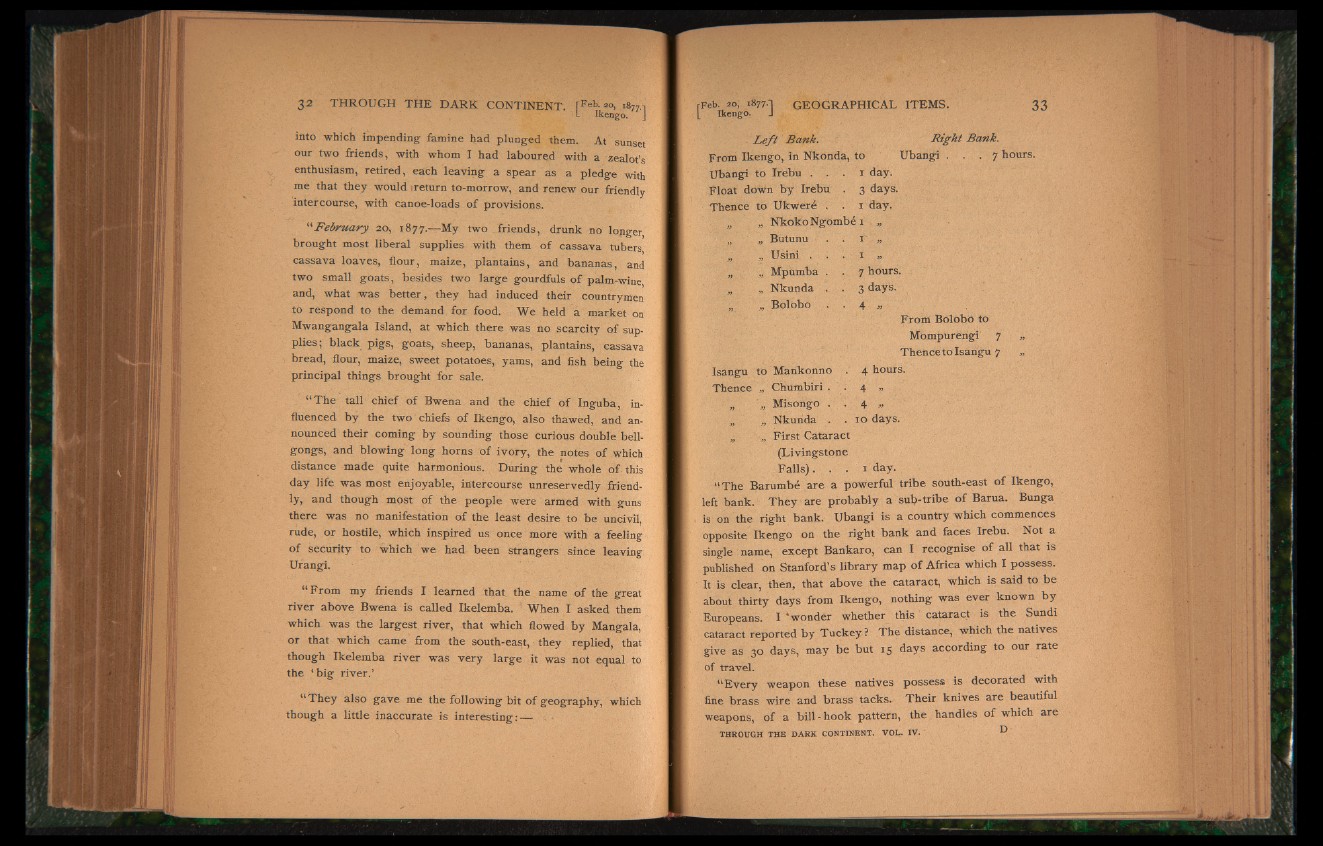
into which impending famine had plunged them. At sunset
our two friends, with whom I had laboured with a zealot’s
enthusiasm, retired, each leaving a spear as a pledge with
me that they would ¡return to-morrow, and renew our friendly
intercourse, with canoe-loads of provisions.
'■'•February 20, 1877.— My two friends, drunk no lopger
brought most liberal supplies with them of cassava tubers,
cassava loaves, flour, maize, plantains, and bananas, and
two small goats, besides two large gourdfuls of palm-wine
and, what was better, they had induced their countrymen
to respond to the demand for food. We held a market on
Mwangangala Island, at which there was no scarcity of supplies;
black pigs, goats, sheep, bananas, plantains, cassava
bread, flour, maize, sweet potatoes, yams, and fish being the
principal things brought for sale.
. “ The tall chief of Bwena and the chief of Inguba, influenced
by the two chiefs of Ikengo, also thawed, and announced
their coming by sounding those curious double bell-
gongs, and blowing long horns of ivory, the notes of which
distance made quite harmonious. During the whole of this
day life was most enjoyable, intercourse unreservedly friendly,
and though most of the people were armed with guns
there was no manifestation of the least desire to be uncivil,
rude, or hostile, which inspired us once more With a feeling
of security to which we had been strangers since leaving
Urangi.
“ From my friends I learned that the name of the great
river above Bwena is called Ikelemba. When I asked them
which was the largest river, that which flowed by Mangala,
or that which came from the south-east, they replied, that
though Ikelemba river was very large it was not equal to
the 'big river.’
“ They also gave me the following bit of geography, which
though a little inaccurate is interesting:— t
rFeb- 20. rg77 j GEOGRAPHICAL ITEMS.
Ikengo. J
Left Bank. Right Bank.
From Ikengo, in Nkonda, to Ubangi . . . 7 hours.
Ubangi to Irebu . . . 1 day.
Float down by Irebu . 3 days.
Thence to Ukwere . . 1 day.
„ NkokoNgomb£ 1 „
„ „ Butunu 1 „
„ „ Usini 1 „
„ „ MpUmba . . 7 hours.
„ „ Nkunda . . 3 days.
„ „ Bolobo . . 4 „
From Bolobo to
Mompurengi 7
Thence to Isangu 7 ,,
Isangu to Mankonno . 4 hours.
Thence „ Chumbiri . . 4 „
„ Misongo . . 4 „
„ „ Nkunda . . 1 0 days.
„ „ First Cataract
(Livingstone
Falls). . . 1 day.
“ The Barumbe are a powerful tribe south-east of Ikengo,
left bank. They are probably a sul?-tribe of Barua. Bunga
is on the right bank. Ubangi is a country which commences
opposite Ikengo on the right bank and faces Irebu. Not a
single name, except Bankaro, can I recognise of all that is
published on Stanford’s library map of Africa which I possess.
It is clear, then, that above the cataract, which is said to be
about thirty days from Ikengo, nothing was ever known by
Europeans. I ‘ wonder whether this cataract is the Sundi
cataract reported by Tuckey? The distance, which the natives
give as 30 days, may be but 15 days according to our rate
of travel.
“Every weapon these natives possess is decorated with
fine brass wire and brass tacks. Their knives are beautiful
weapons, of a bill - hook pattern, the handles of which are
THROUGH THE DARK CONTINENT. VOL. IV. ®